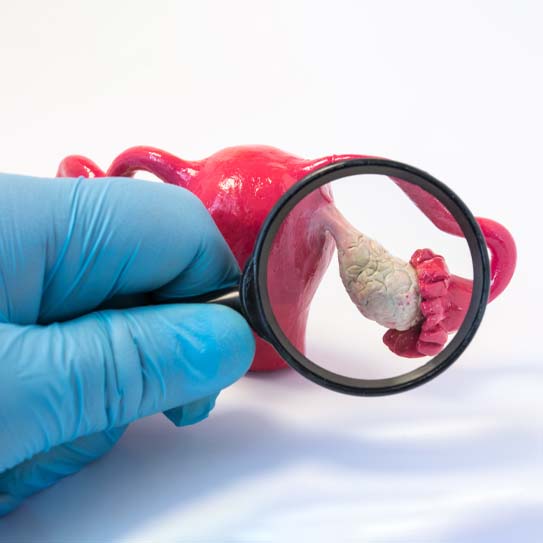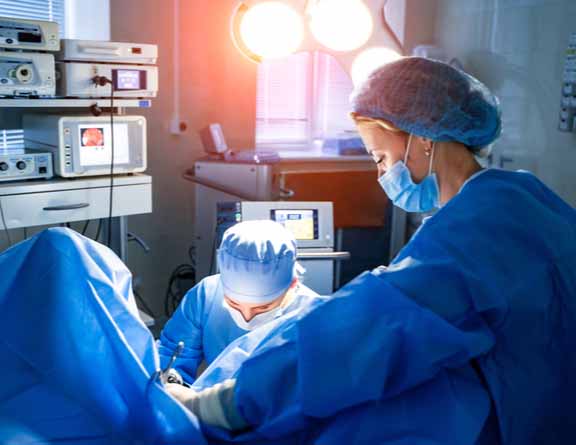
Mumbai
Laparoscopic Ovarian Cystectomy
Confidential Consultation
Expert Female Gynecologists
No-cost EMI


Ovarian Cystectomy - Diagnosis and Treatment Options
To detect the presence, severity, and course of treatment for ovarian cysts, you may be recommended the following tests:
| Treatment Options | Procedure Details |
| Laparoscopic Ovarian Cystectomy | laparoscopic cystectomy is the most advanced surgical option to remove an ovarian cyst. It marks minimal blood loss, negligible scarring, and quick recovery. |
| Open Ovarian Cystectomy | open-cut traditional surgery may take slightly longer, and the complete healing may happen between 3-4 weeks. |
| Oophorectomy | This surgery is typically suggested when there’s ovarian damage, such as ovarian torsion due to cysts, and so the removal of one or both ovaries is necessary. |
As the name suggests, it is performed using a laparoscope, that is, a tiny tube-like instrument with a camera and light on its end. First, the surgeon creates a tiny hole (main port) on the diseased site. Through this, they inject CO2 gas into the patient’s abdominal wall to lift it above the intestine and create better visibility. If needed, 1-2 more small ports may be created to insert necessary surgical instruments. Thereafter, a small camera and light (laparoscope) are passed through the main port to provide maximum visibility and improve the preciseness of the operation. Monitoring the site through the digital screen, the surgeon removes the cyst through the main port and closes it through a stapler or 1-2 stitches. The other smaller ports heal naturally. Mostly, the patient can go home the same day and substantial recovery can be expected within 2-3 days.
As the name suggests, it is done through an open-cut incision on the diseased site. The surgeon then removes the troubling cyst and closes the incision through stitches. The method is usually recommended only in case of an exceptionally large, cancerous, or complicated ovarian cyst. It is comparatively more invasive, marks heavier blood loss, visible post-surgical scars, and a longer recovery period.
In very rare cases, sometimes, the doctors may suggest an oophorectomy surgery or the ‘ovary removal’ surgery. This surgery is typically suggested when there’s ovarian damage, such as ovarian torsion due to cysts, and so the removal of one or both ovaries is necessary.
Certified Female Gynecologists. Quick & Rapid Recovery.
Our team consists of the top gynecologists in India with extensive experience in performing ovarian cyst surgery and ensuring the patient faces minimal discomfort in the process.
To help patients manage the expense of ovarian cyst treatment, we provide No-Cost EMI offers. By availing of these offers, patients can pay for their ovarian cyst surgery in convenient and affordable monthly installments.
Our expert Gynaecologist spend a lot of time with you to diagnose your condition. You are assisted in all pre-surgery medical diagnostics. We offer advanced laser and laparoscopic surgical treatment. Our procedures are USFDA approved.
We ensure 100% confidentiality of the patients throughout the treatment process. All the treatment details and documentation are kept secure, and no information, under any circumstance, is leaked to an outside party.
Cysts of size <3cm usually dissolve on their own and do not require any specific treatment. While cysts that are in the range of 5-7cm or larger start causing pain and bleeding and may require surgical treatment.
Laparoscopic ovarian cystectomy costs around Rs 40,000 to Rs. 70,000 in Mumbai. The exact price may vary on your choice of hospital, doctor’s fee, days of hospitalization, medication, and other medical and non-medical factors.
Pristyn Care has some of the best and most reputed gynecologists in Mumbai. Our surgeons specialize in minimal access surgeries (MAS) and track excellent patient reviews for the past 10-15 years.
No. Doctors suggest you keep a 6-8 hour fast before the surgery. Else you could have anesthesia-related side-effects or complications. This is why we schedule your surgeries early in the morning after overnight fasting.
Ovarian cyst removal surgery is a slightly delicate procedure and may take anywhere between 1-3 hours. However, this time may also vary basis your individual health, co-morbidities, surgery method, doctor’s experience, etc.
The hospitalization required after ovarian cystectomy depends on your chosen surgery method. While a conventional open-cut ovarian cyst surgery requires a typical of 1-3 days of hospital stay, you may be relieved the same day or next after laparoscopic ovarian cystectomy.
Yes. Ovarian Cyst removal surgery falls under the medically necessary bracket of insurance and is hence covered by most insurance providers in India. However, the same may vary from policy to policy, case to case, or on the reason for the surgery undertaken. We suggest you call us directly for a more precise answer on your individual case and policy.
While recovery after open-cut ovarian cystectomy takes well over 15-20 days, substantial recovery can be expected within 3-5 days after laparoscopic ovarian cystectomy.
In most cases, you can join back work within 3-5 days after laparoscopic ovarian cystectomy. However, please confirm the same from your doctor if your work requires a lot of heavy physical activity/ exertion.
While you can cover the short distance travel even on the same day or next, we suggest you wait for at least 5- 7 days for longer distances. However, if traveling is urgent and can’t be avoided, please talk about the same with your doctor. They could then guide you more on the precise diet, medicines, and lifestyle to rule out any discomfort during travel.
No. Ovarian cystectomy removes only the cyst and not the ovaries. Therefore, it does not affect a woman’s fertility. However, as the diseased site is slightly critical, we suggest you choose only a very well-experienced surgeon to rule out any avoidable surgical complications.
Typically, one can resume their sexual life within 10 days post laparoscopic surgery. However, it may differ from person to person. We suggest you take enough rest and resume only after you feel fully recovered and healthy.
While most modern-day surgeries, especially laparoscopic surgeries are extremely safe and mark minimum risks or complications because of better visibility and access, there is always a slight chance of risk because of the nature of surgical complexity. These rare circumstances include-
How to prepare for ovarian cyst surgery?
Here is a general guideline to help you prepare for the surgery:
Guidelines and diet for better recovery after an ovarian cyst surgery
We suggest the following guidelines for a smooth recovery after ovarian cyst surgery:
| Sr.No. | Doctor Name | Ratings | Experience | Address | Book Appointment |
|---|---|---|---|---|---|
| 1 | Dr. Amit Agrawal | 5.0 | 15 + Years | Plot no 12, Sector 2, Nerul West, Navi Mumbai | Book Appointment |
| 2 | Dr. Vinit Ramesh Dhake | 4.6 | 15 + Years | -- | Book Appointment |
| 3 | Dr. Honey Irtesh Mishra | 4.6 | 14 + Years | Shah Arcade, 3, Rani Sati Rd, near Passport Office, Malad East, Mumbai, Maharashtra 400097 | Book Appointment |
Simran Gaonkar
Recommends
My ovarian cyst caused discomfort and anxiety until I sought help from Pristyn Care. The doctors were attentive and understanding, addressing my fears with patience. They recommended the best treatment plan for me. Pristyn Care's team was caring and supportive during my recovery, guiding me every step of the way. Thanks to Pristyn Care, I'm now cyst-free and living a worry-free life.
Sumitra Tiwari
Recommends
A great experience overall. We were provided her great experience in the field of Gyanecology by Pristyn Care team in Mumbai. Very happy with the overall experience.
Ranvir Ghosh
Recommends
Dr. Amit was very helpful and polite to me and my wife. We were very afraid of the surgery but he assured us that my wife’s satefy was of their utmost priority. The surgery was successful and the Ovarian cyst has been has been removed. Thank you.
.svg)
.svg)
.svg)